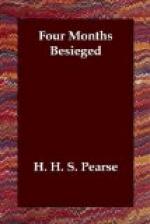January 18.—Kaffir runners report that General Lyttelton’s division crossed the Tugela at Potgieter’s Drift yesterday, and Sir Charles Warren’s at Trichard’s Drift to-day. We also hear of Lord Dundonald being near Acton Homes with a force of Irregular Horse, some of whom wear sakkabulu feathers in their hats and carry “assegais.” Possibly these are Lancers, but we cannot identify them. These stories may be true, for we hear heavy firing in the south-west at frequent intervals. The Intelligence Department expects an attack on one of our outposts to-night. Therefore we may go to bed and sleep in peace.
January 22.—Since Friday Sir Redvers Buller’s guns have been pounding away for several hours of every day, beginning sometimes at dawn or carrying on far into the night. The throbbing vibrations of heavy artillery afar off seemed to fill the air all through Sunday, and we have seen shells bursting along the heights of Intaba Mnyama or Black Mountain, not much more than twelve miles in a straight line from Ladysmith. If our troops are attacking positions successively where there is no more water than can be brought to them from the Tugela they must be having a hard time, for the shade temperature at midday rises to 104 deg., and we know by experience what that means in the full blaze of sunshine on bare kopjes where the smooth boulders feel scorchingly hot to the touch. I watch the distant cannonade with a keen personal interest, for when there is fighting along the Tugela the South African Light Horse are surely in it.
Before daybreak this morning Colonel Knox, in command of Mounted Infantry, Carabiniers, Border Mounted Rifles, and a detachment of Colonel Dartnell’s Frontier Field Force went out to make a reconnaissance round one shoulder of Bulwaan. They got up through the wooded neck, had a look into the Boer position but saw not an enemy, and got back without having a shot fired at them until they showed in the plain again. Then ping! ping! came the Mauser bullets, and a “Pom-Pom” opened on them. Colonel Knox gave an order for his men to form loose order and gallop, and thus they got out of danger with not a man hit.




